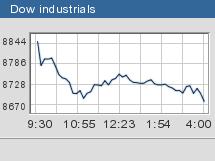NEW YORK (CNN/Money) -
The Nasdaq snapped a four-session win streak Tuesday amid a selloff in biotechs and chip stocks, while disappointing consumer confidence data and weakness in financials deflated the Dow industrials.

The Nasdaq composite (down 37.47 to 1444.43, Charts) closed down 2.5 percent. The Dow Jones industrial average (down 172.98 to 8676.42, Charts) fell 1.9 percent, and the Standard & Poor's 500 index (down 19.57 to 913.31, Charts) slumped 2.1 percent.
Biotechs never recovered after downgrades hit sector stocks Biogen and IDEC Pharmaceuticals. The broader market was plagued by selling in brokerage and consumer products stocks.
Market breadth was negative. On the New York Stock Exchange decliners beat advancers 2 to 1 as 1.3 billion shares were traded. On the Nasdaq, losers similarly beat winners 2 to 1 as 1.7 billion shares changed hands.

After the close of trading Sun Microsystems (SUNW: down $0.04 to $3.76, Research, Estimates) said in its mid-quarter update that its second-quarter revenue is expected to be in line with estimates, but the company did not offer a forecast on its bottom line. Sun Microsystems rose a penny to $3.77 in after-hours trading.
Wednesday's deluge of economic updates include key reads on consumer sentiment, October personal income, and spending and durable goods orders.
Expectations are that income came in flat in October while spending grew by just 0.2 percent. As for the Michigan report, it's expected to be unrevised for November at 85.1.
Economists expect a gain of 3 percent in durable goods orders, reversing much of September's decline.
Also on tap is the widely watched November Chicago Purchasing Managers' report. Expectations are that it improved slightly, rising to 47.5 from last month's 45.9.
Consumer confidence a bit wobbly
Investors started backing out of stocks early in the session after the Conference Board's Consumer Confidence Index for November came in weaker than expected at 84.1. Economists surveyed by Briefing.com expected a reading of 85; the index was a revised 79.6 in October.
The report also overshadowed a positive update on third-quarter GDP that showed the U.S. economy grew more briskly, spurred by robust auto sales.
Some market analysts said that while the data weren't dismal, investors wanted to see economic reports that give more tangible evidence that a recovery is underway in order to sustain a rally sentiment.
"The consumer confidence and housing data were hopeful but not enough to reinvigorate a market that needs a break," said Charles Payne, CEO and market analyst with Wall Street Strategies. "We need numbers to beat estimates. Also, today's data put lots of pressure on tomorrow's (Wednesday's) personal income and (University of Michigan) consumer sentiment numbers to show improvement."

Fund managers also pointed to "tax-loss selling" by institutional investors as another crosscurrent contributing to the day's declines.
"Institutional fund managers want to minimize taxes for their clients at this time of the year," said Sarat Sethi, portfolio manager with Douglas C. Lane & Associates. "They close their books toward the year end. So, in order to offset the profits with the losses in their clients' portfolios, they sell their high-cost poor-performing stocks in November and buy back some of these stocks in January, after a stipulated 30-day waiting period."
That strategy also typically creates what some analysts call the "January effect," in which institutional buying at the beginning of the year drives up stocks.
Sethi added that trading this week was likely to be choppy on a day-to-day basis in the holiday-shortened week on Wall Street. The markets are closed Thursday for the Thanksgiving holiday and put in only a half-session Friday.
Biogen slumps on 'sell' call; 3M undone
Techs, biotechs and financials, sectors that have been advancing in recent weeks, were hard-hit Tuesday.
Merrill Lynch downgraded biopharmaceutical Biogen (BGEN: down $3.32 to $42.91, Research, Estimates) to "sell" from "neutral," saying it believes the current stock price does not reflect significant downside risk to sales of the company's multiple sclerosis drug Avonex.

Shares of IDEC Pharmaceuticals (IDPH: down $3.40 to $32.84, Research, Estimates) were battered after Merrill Lynch downgraded the stock to "neutral" from "buy", citing concerns over slowing growth of its key non-Hodgkins' lymphoma treatment Rituxan.
Among chip stocks, semiconductor maker Semtech (SMTC: down $3.56 to $14.55, Research, Estimates) fell after warning about its fourth-quarter revenue.
Selling in brokerage, consumer products and blue-chip technology stocks pummeled the Dow industrials and the broader market. Morgan Stanley (MWD: down $2.02 to $44.32, Research, Estimates) led the decliners among the financials after Prudential Financial downgraded it to "hold" from a "buy," citing valuation concerns.
The sector downturn came amid reports about how much in fines Wall Street firms face to settle a conflict-of-interest probe into the banks' initial public offering and research practices. Fines of as much as $500 million are expected against Citigroup (C: Research, Estimates), Bear Stearns (BSC: down $2.18 to $62.71, Research, Estimates), Goldman Sachs (GS: down $2.17 to $76.83, Research, Estimates), and J.P. Morgan Chase (JPM: down $0.76 to $24.19, Research, Estimates).
3M (MMM: down $3.25 to $125.40, Research, Estimates) was the biggest loser on the Dow following a Merrill Lynch report that raised some concern about the stock's valuation. Merrill said that while 3M is on track to achieve double-digit earnings growth, it will have to rely increasingly on acquisitions to maintain that momentum. The brokerage initiated a "neutral" rating on the stock.
In overseas markets, Asian-Pacific stocks ended lower Tuesday, with Tokyo's Nikkei index snapping a five-session winning streak. European markets finished mostly lower.
Treasury prices were higher, sending the 10-year note yield down to 4.07 percent. The dollar weakened against the yen and the euro.
Light crude oil futures gained 29 cents to $26.40 a barrel in U.S. trading. Gold traded lower.

|

